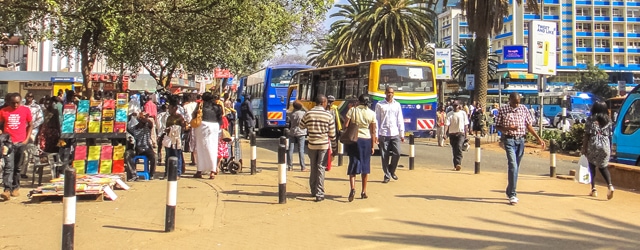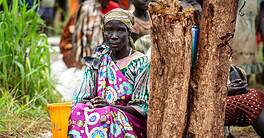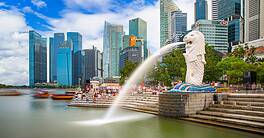Kenya has a growing entrepreneurial middle class and a government committed to drawing more foreign direct investment.

Kenya has created a positive environment for foreign direct investment (FDI), as it looks to appeal to foreign multinationals. The government sees FDI as a job creator and plans to continue its efforts.
“Kenya is in the best condition it has been in [for] 10 years,” says Kwame Owino, chief executive officer of the Institute of Economic Affairs, during an interview from Nairobi.
The flows continue for a variety of reasons, including the country’s position on the continent. “Kenya’s main advantage is that it is an economic hub for the region,” Kwame explains. After a sharp drop during the global financial crisis, FDI inflows have dramatically increased each year since, rising from less than $300 million in 2012 to $1.4 billion in 2015.
Its membership in the East African Community, a bloc of six countries, complements the hub status. Kenya has a single-window customs system, an educated work force and a highly developed telecommunications sector with several innovations including mobile payments system M-PESA.
“The EAC is the best integrated of the African communities in terms of free trade and transportation links,” explains Melissa Cook, managing director of African Sunrise Partners. “When companies look at the size of the addressable market (estimated at 150 million people), it’s a more viable concept in the EAC than in some other markets.” Cook stresses the importance of infrastructure improvements, such as the standard-gauge railway currently being funded by China and built by Chinese companies that links the port of Mombasa to Nairobi and other centers. “Kenya is way ahead of other countries in bringing high-speed data links to businesses and consumers across the country,” she explains.
Not surprisingly, technology holds significant FDI opportunities. Encouraged by the success of this specialized sector, the government has included plans for a new technology city in its Kenya Vision 2030 long-term development plan. The multibillion-dollar development is expected to generate a huge number of jobs while also attracting FDI from international technology companies and local entrepreneurs, according to a Control Risks report entitled East Africa’s Tech Hub. The government hopes to see a new range of businesses, including call and data centers and software development companies. However, the Control Risks report cautions that financing has not yet been secured, and the government has not had unmitigated success in other big projects it has undertaken.
Notwithstanding the positive environment, a foreign direct investor must consider several risks. Although there have been no terrorist incidents recently, the American, Australian and British governments have issued warnings about the danger of terrorism in certain areas. Other challenges include higher local interest rates on loans raised in Kenya than foreign investors would pay in their home markets, and periodic drought, which threatens agriculture projects.
Potential opportunities include oil exploration in the north of the country, although the global drop in oil prices, which has led to some delays in exploration and investment, may have an impact. Still, opportunities abound in manufacturing, financial services, agriculture, consumer goods and tourism. The infrastructure project called LAPSSET (Lamu Port–South Sudan–Ethiopia Transport Corridor), consisting of a large port, a railway, oil pipelines, highways, international airports and cities, is a massive undertaking.
|
Vital Statistics |
|
Location: East Africa |
|
Neighbors: Tanzania, Uganda, South Sudan, Ethiopia, Somalia |
|
Capital city: Nairobi |
|
Population (2016): 46,790,758 |
|
Official language: English and Swahili |
|
GDP per capita (2016): US$1,521.90 |
|
GDP growth (2016): 5.9% |
|
Inflation (2016): 6.2% |
|
Currency: Kenyan Shilling |
|
Investment promotion agency: KenInvest |
|
Investment incentives available? Tax credits and incentives, some of them geographically based |
|
Ease of Doing Business rank (2016): 92 |
|
Corruption Perceptions Index rank (2016): 145 |
|
Political risk: Uncertainty over August election; uncertainty over telecom break-up; history of ethnic tensions |
|
Security risk: History of ethnic tensions and corruption scandals |
|
PROS |
|
Well-developed supply chains |
|
Well-developed communication links with other countries |
|
Kenya Vision 2030 calls for more Special Economic Zones |
|
Guaranteed repatriation of profits and capital gains after taxes |
|
Cons |
|
Labor problems |
|
Concern whether US President Donald Trump’s protectionist policies will lead to cancellation of the African Growth and Opportunity Act, or AGOA |
|
Many medical facilities are closed or operating at extremely reduced levels. |
|
Upcoming election could bring a slowing of government activity |
Sources: A.M. Best Rating Services; Australian Government Department of Foreign Affairs and Trade; Bloomberg News; CIA World Factbook; Control Risks; Daily Nation; GOV.UK travel advice; International Monetary Fund; Oxford Business Group; Transparency International; World Bank
For more information on Kenya, check out our Country Economic Reports at:
GFMag.com/gdp-data-country-reports.html



